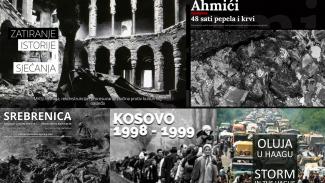
Interactive narratives
SENSE began the production of interactive narratives in 2015, while still in the process of transforming from news agency to transitional justice center. Along with traditional production techniques, we used an online format that proved to be ideal for presenting and making accessible to a global public how the crimes committed in Yugoslav wars of the 1990s were investigated, reconstructed and prosecuted by the International Criminal Tribunal for the former Yugoslavia (ICTY).
From the crimes committed at single location (such as Srebrenica and Ahmići), or in wider areas (Kosovo, Krajina in Croatia), to the crimes against specific targets like cultural, historic and religious heritage (targeting monuments), the interactive narrative as a platform gave us the opportunity to use not only audio-visual material from ICTY trials: victims’ and witness’ testimonies, documentary footage from the war, and forensic evidence, but also exhibits introduced in evidence. Our aim is to select, organize, make understandable, visible and widely accessible the main facts about the events of the wars of the 1990s in the former Yugoslavia, established beyond reasonable doubt at the ICTY trials.
So far, SENSE has produced five online Interactive Narratives: Storm in The Hague (2015); Srebrenica: Genocide in Eight Acts (2015); Targeting History and Memory (2016); Kosovo Cases 1998-1999 (2017) and Ahmići: 48 Hours of Ashes and Blood (2019).
With their clean typography, minimalist layout and linear navigation, the online interactive narratives have been designed to capture and convey the narrative’s message to a wide audience. Readability across all devices and browsers has been achieved with carefully selected typefaces and well-defined design styles.
Technologies and techniques used for the narrative have been selected to bring the narrative to wide range of devices and browsers and to ensure its availability for extended future use. Videos and other large media content are delivered to end users through an external cloud platform to ensure fast download and errorless streaming across the globe.
The audio visual content of the Srebrenica and Kosovo narratives and its databases, along with a selection of documents and other exhibits, are on a permanent display in the Documentation Centres in Potočari and Priština, developed and opened jointly by SENSE Transitional Justice Center and its local partners: Srebrenica Memorial and Kosovo Humanitarian Law Center.
Online narratives and local documentation centers serve as living and easily available resources that provide the public with the ability to further reconstruct the events, to confront the past, to delegitimize myths, and to counter the politics and culture of denial, which are still very much present in the region.
TV Tribunal
The production of weekly TV updates from ICTY courtrooms, called TV Tribunal, began in March 2000. By spring 2017, SENSE had produced 722 thirty-minute TV programs (about 360 hours of television programming), not missing a single working week of the ICTY. Each program consists of several stories about the most important and most interesting events that marked the Tribunal's trials – victims’ and witnesses’ testimonies, presentation of forensic evidence as well as reports on various aspects of the Tribunal's work. In addition to being set up for online streaming, TV Tribunals had also been regularly broadcast by major TV networks and a number of local TV stations in the region.
Documentary films
In addition to daily reports from the ICTY court and weekly TV updates, SENSE produced seven documentary films: Triumph of Evil (2001), about the Srebrenica genocide trial of General Krstic; Against All Odds (2004) on the first ten years of the ICTY; Beyond Reasonable Doubt (2005) confronting established facts and denialist theories about the Srebrenica genocide and three documentaries about the case of Radovan Karadzic and Ratko Mladic: The Fugitives (2004), Life and Deeds of Radovan Karadzic (2005), Rise and Fall of General Mladic (2005). Finally, on the occasion of the 20th anniversary of the beginning of the siege of Sarajevo, SENSE produced Sarajevo Roses – Terror in 12 Pictures (2013).
SENSE documentaries have been broadcast numerous times on major regional TV networks in Bosnia-Herzegovina, Serbia, Montenegro, North Macedonia, Croatia and Slovenia, but also in the rest of Europe (France, Sweden, Poland, Estonia, Turkey) and in Asia (Japan, Qatar, Democratic Voice of Burma). SENSE documentaries have been selected and screened at international film festivals in Amsterdam, Bologna, Prague, Warsaw, Paris, Berlin, Trieste, Barcelona, Glasgow and Mumbai.
Use of SENSE audio-visuals for teaching
Many NGOs, institutes, universities and individual academics and researchers from around the world have screened SENSE documentary films in the course of lectures, conferences, seminars and symposiums. A number of universities have included SENSE’s films and online narratives as teaching tools, particularly in their international criminal justice curricula. Among them are: Yale University, Columbia University, Cornell University, Haverford College, Washington & Lee University, the American University (all USA) and University of Florence and the Centre for Applied Research on International Criminal Justice (Italy).
